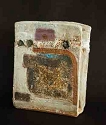 |
| White decorated slab stoneware 25 x 20 x 6cm |
 |
| Large brown slab stoneware 39cm x 20cm x 9cm |
 |
| Oval vessel with bronze lustre stoneware 28cm x 13cm |
 |
| Round vessel with lustre top stoneware 33cm x 15cm diam. |
Robin Welch
Robin Welch is a highly acclaimed and respected potter, now in his seventies, whose work has crossed the boundaries of art, ceramics and sculpture. He has developed a considerable reputation for his freely constructed individual pots, the making of which has been interspersed with tableware production, architectural work, teaching and residencies in Australia and the United States. The art critic David Whiting writes: "His is a genuinely individual voice. There is no one else quite like him in British pottery."
His ceramic education was unusually broad. While at Penzance School of Art, he spent weekends at the Leach Pottery learning much about his materials, but his time at the Central School took him beyond the Oriental world. Innovative teachers like William Turnbull and Gordon Baldwin helped Welch to look outside the ceramic orbit for ideas, initiating a broader, more sculptural perspective, and he was also influenced by the paintings and powerful use of colour by American artist Mark Rothko.
In 1962, with Ian Sprague, he set up a pottery near Melbourne which he describes as "pretty pioneering stuff", but Australia provided him with not only an enthusiastic audience, but also abundant inspiration in its landscape, flora and light conditions. Welch returned to Britain in 1967 and set up a pottery in Suffolk, where he developed a range of domestic stoneware, the production of which lasted until the early 80s.
It is his studio still; packed with work in progress - drawings, paintings and a mass of ceramic forms in various states of production. He is constantly exploring, using different building techniques and multiple firings with layers of glaze, creating original works which explore colour, surface texture, form, detail of edge and line.
